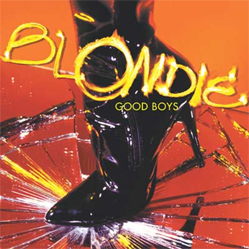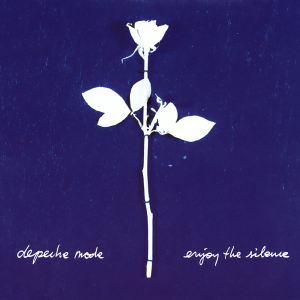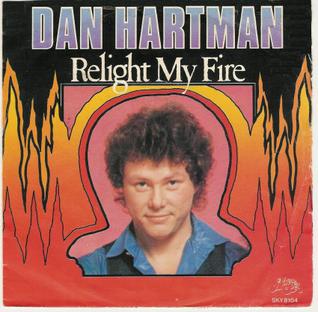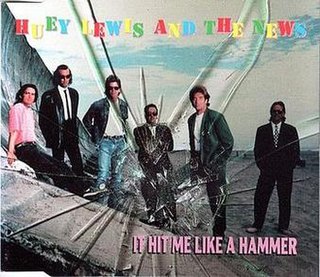
"We Will Rock You" is a song by the British rock band Queen for their 1977 album News of the World, written by guitarist Brian May. Rolling Stone ranked it number 330 of "The 500 Greatest Songs of All Time" in 2004, and it placed at number 146 on the Songs of the Century list in 2001. In 2009, "We Will Rock You" was inducted into the Grammy Hall of Fame.

Exit Planet Dust is the debut studio album by English electronic music duo the Chemical Brothers. It was first released on 26 June 1995 in the United Kingdom by Junior Boy's Own, Freestyle Dust, and Virgin Records, and on 15 August 1995 in the United States by Astralwerks. The album was recorded between August and November 1994, with "Song to the Siren" performed live. Its title is a reference to their departure from their earlier name the Dust Brothers.

"Everything Must Go" is a song by Welsh alternative rock band Manic Street Preachers, released as the second single from their fourth studio album, Everything Must Go (1996), on 22 July 1996. The song reached number five on the UK Singles Chart.

"Crystal" is a song by English rock band New Order. The song was released on 11 July 2001 as the first single from their seventh studio album, Get Ready (2001). "Crystal" entered the UK Singles Chart at number eight, attracting considerable attention and critical praise as the band's comeback single, their first original since 1993. The song also found success internationally, peaking at number three in Canada, number seven in Finland, and reaching the top 50 in Germany, Ireland, Italy, and Sweden. "Crystal" appears as the first track on the album in a version different from the single release, with an extended intro and coda.

"Jerk It Out" is a song by Swedish rock band Caesars. It was released in 2002 as the lead single from their album Love for the Streets; it is also featured on the follow-up Paper Tigers in remixed form. The song was an international success following a re-release in 2005, reaching number eight on the UK Singles Chart and peaking at number 70 on the US Billboard Hot 100.

"Good Boys" is a song by American rock band Blondie. Issued on August 11, 2003, it was the only single released from their eighth studio album, The Curse of Blondie (2003). The single was released as part of a two-CD set and on 12-inch vinyl. CD 1 features live versions of "Maria" and "Rapture", plus the video for "Good Boys" directed by Jonas Åkerlund. CD 2 features a remix by Giorgio Moroder. The 12-inch vinyl features remixes by Giorgio Moroder, Arthur Baker, and Scissor Sisters.

"Enjoy the Silence" is a song by English electronic music band Depeche Mode. Recorded in 1989, it was released as the second single from their seventh studio album, Violator (1990), on 5 February 1990. The single is certified Gold in the US and Germany. The song won Best British Single at the Brit Awards 1991.
The Mock Turtles are an English indie rock band, formed in Middleton, Greater Manchester, in 1985, who enjoyed some success in the early 1990s. Their most famous song "Can You Dig It?", which was released in the UK in 1991, charted at number 18. When the song was re-released in slightly remixed form in 2003, it again reached the top 20 of the UK Singles Chart.

"Disappear" is a song by Australian rock band INXS, released as the second single from their seventh studio album, X (1990), in November 1990. The song was written by Jon Farriss, Michael Hutchence and Garry Gary Beers while they were living together in Hong Kong in 1989.

"I Can't Dance" is the fourth track from English rock band Genesis's fourteenth studio album, We Can't Dance (1991), and was released in December 1991 as the second single from the album. Lyrics were composed by drummer Phil Collins; music was written collectively by the band. The song peaked at number seven on both the US Billboard Hot 100 and the UK Singles Chart, and also received a Grammy Award nomination for Best Pop Performance by a Duo or Group With Vocals in 1993. In Europe, the song reached number one in Belgium and the Netherlands, while peaking within the top five in Austria, Germany, and Portugal.

"Girlfriend" is a pop and hip hop song by American boy band NSYNC. It was released on January 14, 2002, as the third single from their fourth studio album Celebrity. It was the group's last song to enter the top 10 of the US Billboard Hot 100, peaking at number five. "Girlfriend" additionally reached number one in Canada and charted within the top 10 in six other countries, including Australia, Germany, and the United Kingdom. This was the last single and song the band released in their career before their reunion in 2023.

"Ordinary World" is a song by English rock band Duran Duran, released in December 1992 by Parlophone, EMI and Capitol as the first single from their self-titled album (1993), commonly known as the Wedding Album. The ballad, both written by the band and co-produced with John Jones, reached No. 1 on the US Billboard Top 40/Mainstream chart, the Canadian RPM 100 Hit Tracks chart, and the Italian Singles Chart. It also peaked at No. 3 on the Billboard Hot 100, No. 2 in Iceland and Sweden, and No. 6 on the UK Singles Chart. The song's music video was directed by Nick Egan and filmed in California.

"Relight My Fire" is a disco song written and released by American musician, singer, songwriter, and record producer Dan Hartman as the title track from his 1979 album of the same name. It was also performed by Costa Anadiotis' band Café Society in 1984 and British boy band Take That in 1993, five months before Hartman died.

"Special Cases" is a song by English trip hop group Massive Attack featuring vocals from Irish singer-songwriter Sinéad O'Connor, who also co-wrote the track. It appears on Massive Attack's fourth full-length album, 100th Window, and was released as the first single on 24 February 2003.

"Setting Sun" is a song by English electronic music duo the Chemical Brothers featuring vocals from Noel Gallagher of Britpop band Oasis, who also co-wrote the track with duo members Tom Rowlands and Ed Simons. He is not mentioned on the front cover, only in the credit list. It was released as a single on 30 September 1996 from the Chemical Brothers' second album, Dig Your Own Hole (1997).

"Four to the Floor" is a song by British band Starsailor. The song was released as the third and final single from the band's second album, Silence Is Easy (2003), and became a hit, peaking at number one in France and Wallonia, number five in Australia, and number 24 in the United Kingdom. The Thin White Duke remix of the song was ranked number 70 on Triple J's Hottest 100 of 2004 in Australia. As of July 2014, it was the 84th best-selling single of the 21st century in France, with 333,000 units sold.

"Rubberneckin'" is a song performed by Elvis Presley, which was recorded at American Sound Studio. It was used in the film Change of Habit and subsequently issued as the B-side of "Don't Cry Daddy" in conjunction with the movie premiere. It reached number six in the United States on the Billboard Hot 100 in 1969.

"Where the Streets Have No Name (I Can't Take My Eyes Off You)" is a song by English synth-pop duo Pet Shop Boys. The song is a medley of U2's "Where the Streets Have No Name" and "Can't Take My Eyes Off You", a 1967 song by Frankie Valli, though in an arrangement informed by the 1982 disco version of the song by the Boys Town Gang rather than the original. The song accompanied "How Can You Expect to Be Taken Seriously?", the third single from their fourth studio album, Behaviour (1990), as a double A-side in the United Kingdom (both singles were released separately in the United States). Released in March 1991 by Parlophone, the song became the duo's 15th consecutive top-20 entry in the UK, peaking at number four on the UK Singles Chart.

"It Hit Me Like a Hammer" is a song by American rock band Huey Lewis and the News, released in 1991 by EMI USA as the second single from their sixth album, Hard at Play (1991). The song was co-written by band leader Huey Lewis and songwriter/producer Robert John "Mutt" Lange. The song peaked at No. 21 on the US Billboard Hot 100, becoming their final top-40 hit in the US, and No. 9 on Canada's RPM 100 Hit Tracks chart. The single release contains a remix of the song with a saxophone solo that did not appear on the album.

"Ace of Hearts" is a song by British singer-songwriter Chris Rea, which was released by Magnet in 1984 as the fourth and final single from his sixth studio album Wired to the Moon. The song was written by Rea, and produced by Rea and Dave Richards.



















